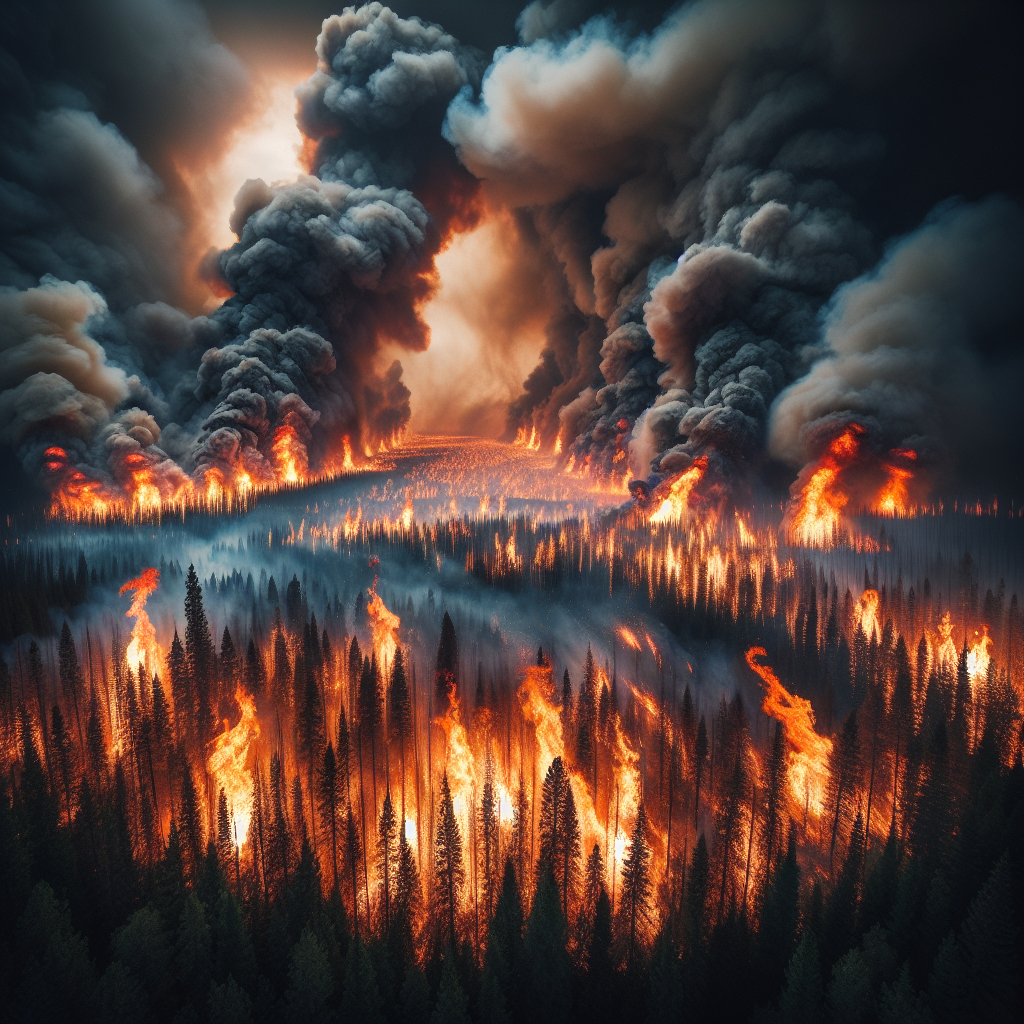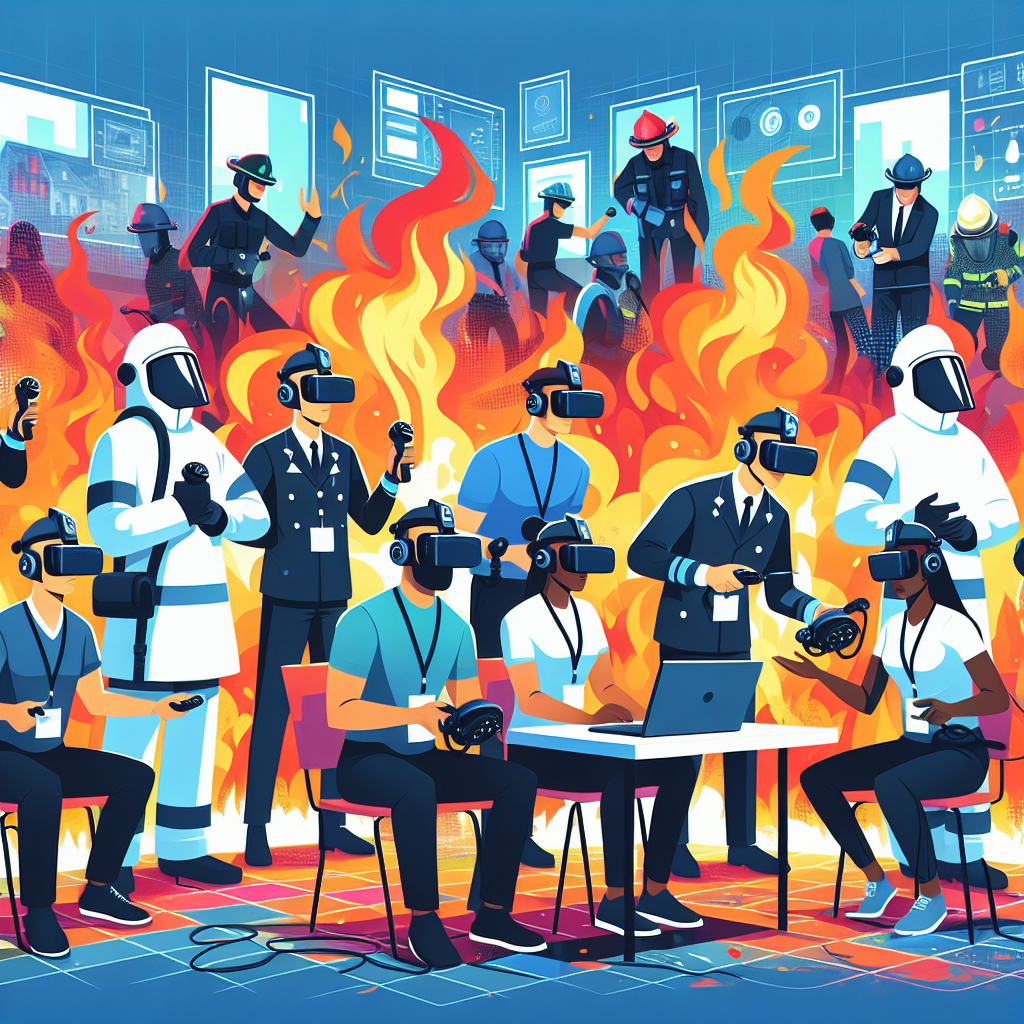Canada is having many wildfires this year because of dry weather and warmer temperatures. These fires have made thousands of people leave their homes in places like Alberta, British Columbia, and Manitoba. Some fires started from lightning, and others from things like trees falling on power lines. Right now, there are 135 fires burning, and 39 of them are out of control.
In recent years, wildfire season in Canada has been starting earlier. It used to start in July or August, but now it can start as early as May. Last year was the worst fire season ever, with a huge amount of land burned. This year, the fires started early again, but experts think it might not be as bad as last year.
The dry weather, lightning, and human actions, along with warmer temperatures from climate change, make Canada more likely to have wildfires. These more frequent and severe wildfires show that it’s important to take action against climate change. It’s also important to find ways to protect people and the environment from these fires.
Original news source: Why is Canada having so many wildfires this season? (BBC)
🎧 Listen:
Slow
Normal
Fast
📖 Vocabulary:
| 1 | wildfires | Large, uncontrolled fires that spread quickly in forests or grasslands |
| 2 | temperatures | How hot or cold something is |
| 3 | lightning | A flash of light in the sky during a storm |
| 4 | power lines | Wires that carry electricity |
| 5 | control | To manage or keep something in check |
| 6 | season | A specific time of the year when something happens |
| 7 | experts | People who know a lot about a certain subject |
| 8 | severe | Very serious or bad |
| 9 | climate | The usual weather conditions in a place |
| 10 | environment | The natural world around us |
| 11 | frequent | Happening often |
| 12 | protect | To keep someone or something safe from harm |
Group or Classroom Activities
Warm-up Activities:
– Charades
Instructions: Divide the class into small groups. Write key words from the article on separate slips of paper and put them in a hat. Each group will take turns choosing a slip of paper and acting out the word without speaking. The other groups must guess the word. The group that guesses correctly earns a point.
– News Summary
Instructions: Have the students read the article individually or in pairs. Then, ask each student to write a summary of the article in 3-4 sentences. Afterward, have them share their summaries with a partner and discuss any differences or similarities between their summaries.
– Vocabulary Pictionary
Instructions: Divide the class into pairs. Give each pair a list of vocabulary words from the article. One student will draw a picture to represent a word while the other student tries to guess the word. They can only use gestures and cannot speak. The pair that guesses the most words correctly wins.
– Speed Summarizing
Instructions: Divide the class into small groups. Give each group a timer and ask them to summarize the article in one minute. They can take turns speaking or work together to come up with a concise summary. After each group presents, discuss the main points of the article as a class.
– Think-Pair-Share
Instructions: Have the students discuss the following question with a partner: “What actions do you think should be taken to prevent wildfires and protect people and the environment?” After a few minutes, ask some pairs to share their ideas with the class. Encourage a class discussion on the topic.
🤔 Comprehension Questions:
1. Why are there many wildfires in Canada this year?
2. What are some reasons why the fires started?
3. How many fires are currently burning in Canada?
4. When did wildfire season in Canada used to start?
5. Was last year a bad year for wildfires in Canada?
6. What are some factors that make Canada more likely to have wildfires?
7. Why is it important to take action against climate change?
Go to answers ⇩
🎧✍️ Listen and Fill in the Gaps:
Canada is having many wildfires this year because of dry weather and warmer temperatures. These fires have made thousands of people leave their homes in places like Alberta, (1)______ Columbia, and (2)______. Some fires started from (3)______, and others from things like (4)______ falling on power lines. Right now, there are 135 (5)______ burning, and 39 of them are out of control.
In recent years, wildfire (6)______ in Canada has been starting earlier. It used to start in July or August, but now it can start as early as May. Last (7)______ was the worst fire season ever, with a huge amount of (8)______ burned. This year, the fires started early again, but experts think it might not be as bad as last year.
The dry weather, lightning, and human actions, along with (9)______ temperatures from climate change, make Canada more likely to have (10)______. These more frequent and severe wildfires show that it’s important to take (11)______ against climate change. It’s also important to (12)______ ways to protect people and the environment from these fires.
Go to answers ⇩
💬 Discussion Questions:
Students can ask a partner these questions, or discuss them as a group.
1. What is a wildfire?
2. How would you feel if you had to leave your home because of a wildfire?
3. Do you like hot weather? Why or why not?
4. What do you think causes wildfires?
5. Have you ever seen a wildfire? What was it like?
6. How do you think climate change affects wildfires?
7. Do you think it’s important to take action against climate change? Why or why not?
8. What are some ways we can protect people and the environment from wildfires?
9. Have you ever been in a situation where you had to evacuate? How did you feel?
10. Do you think wildfires are a big problem? Why or why not?
11. How can we prevent wildfires from happening?
12. What would you do if you saw a wildfire near your home?
Individual Activities
📖💭 Vocabulary Meanings:
Match each word to its meaning.
Words:
1. wildfires
2. temperatures
3. lightning
4. power lines
5. control
6. season
7. experts
8. severe
9. climate
10. environment
11. frequent
12. protect
Meanings:
(A) To manage or keep something in check
(B) A specific time of the year when something happens
(C) Wires that carry electricity
(D) The natural world around us
(E) The usual weather conditions in a place
(F) Large, uncontrolled fires that spread quickly in forests or grasslands
(G) How hot or cold something is
(H) People who know a lot about a certain subject
(I) Happening often
(J) Very serious or bad
(K) To keep someone or something safe from harm
(L) A flash of light in the sky during a storm
Go to answers ⇩
🔡 Multiple Choice Questions:
1. Why are there many wildfires in Canada this year?
(a) Heavy rain and colder temperatures
(b) Dry weather and warmer temperatures
(c) Strong winds and snowfall
(d) Earthquakes and tsunamis
2. Where have people been forced to leave their homes because of the wildfires?
(a) Ontario, Quebec, and Saskatchewan
(b) Nova Scotia, New Brunswick, and Prince Edward Island
(c) Alberta, British Columbia, and Manitoba
(d) Yukon, Northwest Territories, and Nunavut
3. How do some wildfires start?
(a) Lightning and trees falling on power lines
(b) Heavy rain and strong winds
(c) Earthquakes and volcanic eruptions
(d) Tornadoes and hurricanes
4. How many fires are currently burning in Canada?
(a) 50
(b) 200
(c) 135
(d) 20
5. When did wildfire season in Canada used to start?
(a) May or June
(b) September or October
(c) November or December
(d) July or August
6. What was the worst fire season ever in Canada?
(a) 10 years ago
(b) 20 years ago
(c) 50 years ago
(d) Last year
7. What makes Canada more likely to have wildfires?
(a) Heavy rain, snowfall, and colder temperatures from climate change
(b) Dry weather, lightning, human actions, and warmer temperatures from climate change
(c) Strong winds, earthquakes, and volcanic eruptions
(d) Tornadoes, hurricanes, and tsunamis
8. What is the main message of the article?
(a) It’s important to take action against climate change and find ways to protect people and the environment from wildfires.
(b) Wildfires are a natural occurrence and we shouldn’t worry about them.
(c) Wildfires in Canada are caused by aliens from outer space.
(d) Canada should build more power lines to prevent trees from falling on them.
Go to answers ⇩
🕵️ True or False Questions:
1. Thousands of people have been forced to leave their homes in places like Alberta, British Columbia, and Manitoba because of these fires.
2. Canada is experiencing fewer wildfires this year due to wet weather and cooler temperatures.
3. Currently, there are 100 fires burning in Canada, and 30 of them are under control.
4. Last year was the worst fire season ever in Canada, with a large amount of land burned.
5. In recent years, wildfire season in Canada has been starting earlier, now as early as May.
6. Some of the fires were started by human activity, while others were caused by spontaneous combustion.
7. Experts believe that this year’s wildfire season might be worse than last year’s.
8. The dry weather, lightning, human actions, and climate change contribute to the increased likelihood and severity of wildfires in Canada.
Go to answers ⇩
📝 Write a Summary:
Write a summary of this news article in two sentences.
Check your writing now with the best free AI for English writing!
Writing Questions:
Answer the following questions. Write as much as you can for each answer.
Check your answers with our free English writing assistant!
1. Why are there many wildfires in Canada this year?
2. How have the wildfires affected the people in Alberta, British Columbia, and Manitoba?
3. How do the wildfires start?
4. When did wildfire season in Canada used to start?
5. Why is it important to take action against climate change?
✅ Answers
🤔✅ Comprehension Question Answers:
1. Why are there many wildfires in Canada this year?
There are many wildfires in Canada this year because of dry weather and warmer temperatures.
2. What are some reasons why the fires started?
Some fires started from lightning, and others from things like trees falling on power lines.
3. How many fires are currently burning in Canada?
Currently, there are 135 fires burning in Canada.
4. When did wildfire season in Canada used to start?
Wildfire season in Canada used to start in July or August.
5. Was last year a bad year for wildfires in Canada?
Yes, last year was a bad year for wildfires in Canada.
6. What are some factors that make Canada more likely to have wildfires?
Factors that make Canada more likely to have wildfires are dry weather, lightning, human actions, and warmer temperatures from climate change.
7. Why is it important to take action against climate change?
It is important to take action against climate change because it can help prevent more frequent and severe wildfires. It can also protect people and the environment from the damage caused by these fires.
Go back to questions ⇧
🎧✍️✅ Listen and Fill in the Gaps Answers:
(1) British
(2) Manitoba
(3) lightning
(4) trees
(5) fires
(6) season
(7) year
(8) land
(9) warmer
(10) wildfires
(11) action
(12) find
Go back to questions ⇧
📖💭✅ Vocabulary Meanings Answers:
1. wildfires
Answer: (F) Large, uncontrolled fires that spread quickly in forests or grasslands
2. temperatures
Answer: (G) How hot or cold something is
3. lightning
Answer: (L) A flash of light in the sky during a storm
4. power lines
Answer: (C) Wires that carry electricity
5. control
Answer: (A) To manage or keep something in check
6. season
Answer: (B) A specific time of the year when something happens
7. experts
Answer: (H) People who know a lot about a certain subject
8. severe
Answer: (J) Very serious or bad
9. climate
Answer: (E) The usual weather conditions in a place
10. environment
Answer: (D) The natural world around us
11. frequent
Answer: (I) Happening often
12. protect
Answer: (K) To keep someone or something safe from harm
Go back to questions ⇧
🔡✅ Multiple Choice Answers:
1. Why are there many wildfires in Canada this year?
Answer: (b) Dry weather and warmer temperatures
2. Where have people been forced to leave their homes because of the wildfires?
Answer: (c) Alberta, British Columbia, and Manitoba
3. How do some wildfires start?
Answer: (a) Lightning and trees falling on power lines
4. How many fires are currently burning in Canada?
Answer: (c) 135
5. When did wildfire season in Canada used to start?
Answer: (d) July or August
6. What was the worst fire season ever in Canada?
Answer: (d) Last year
7. What makes Canada more likely to have wildfires?
Answer: (b) Dry weather, lightning, human actions, and warmer temperatures from climate change
8. What is the main message of the article?
Answer: (a) It’s important to take action against climate change and find ways to protect people and the environment from wildfires.
Go back to questions ⇧
🕵️✅ True or False Answers:
1. Thousands of people have been forced to leave their homes in places like Alberta, British Columbia, and Manitoba because of these fires. (Answer: True)
2. Canada is experiencing fewer wildfires this year due to wet weather and cooler temperatures. (Answer: False)
3. Currently, there are 100 fires burning in Canada, and 30 of them are under control. (Answer: False)
4. Last year was the worst fire season ever in Canada, with a large amount of land burned. (Answer: True)
5. In recent years, wildfire season in Canada has been starting earlier, now as early as May. (Answer: True)
6. Some of the fires were started by human activity, while others were caused by spontaneous combustion. (Answer: False)
7. Experts believe that this year’s wildfire season might be worse than last year’s. (Answer: False)
8. The dry weather, lightning, human actions, and climate change contribute to the increased likelihood and severity of wildfires in Canada. (Answer: True)
Go back to questions ⇧















